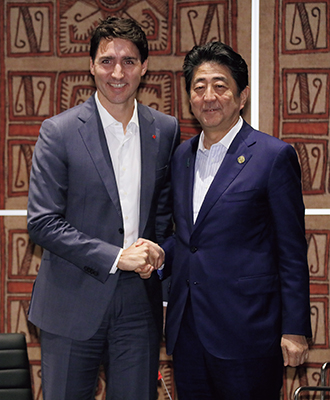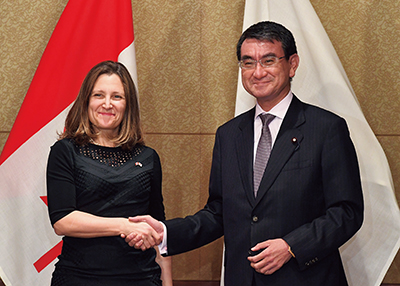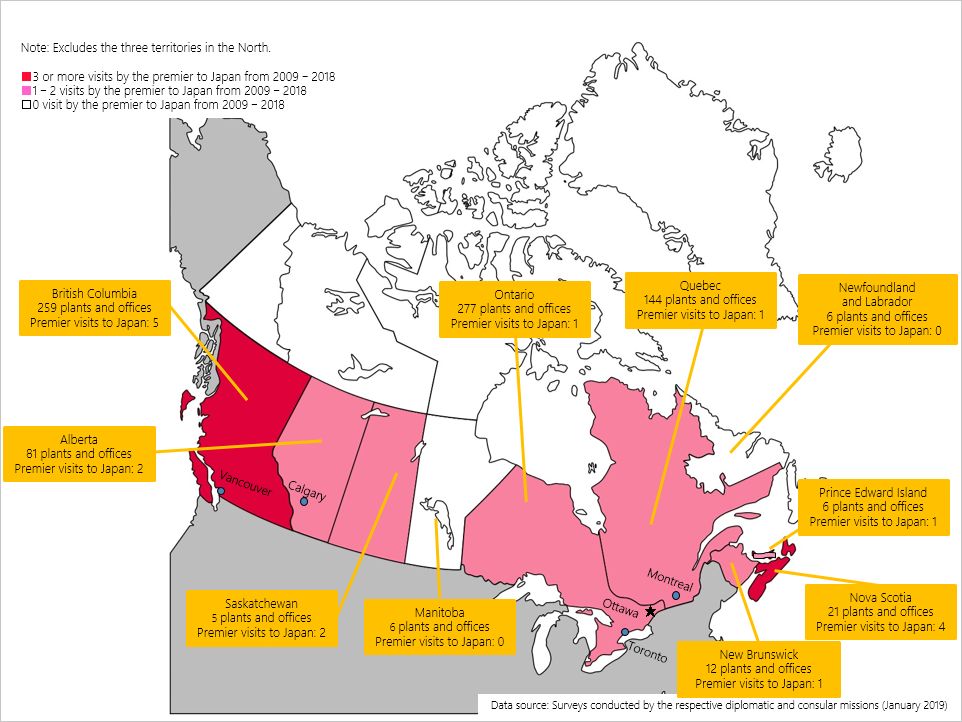Diplomatic Bluebook 2019
Chapter 2
Japan's Foreign Policy that Takes a Panoramic Perspective of the World Map
2 Canada
(1) Situation of Canada
The Trudeau administration has been running the Government steadily for three years since November 2015, despite a slight fall in its approval rating.
On the diplomatic front, Canada led the G7 in dealing with various issues among the international community, commencing with holding a series of meetings including the G7 Charlevoix Summit in June as the G7 presidency in 2018. With regard to the issue of North Korea, Canada and the U.S. co-hosted the Foreign Ministers' Meeting on Security and Stability on the Korean Peninsula in January, and issued a statement that the international community would demonstrate solidarity to maximize pressure on North Korea. In addition, Canada is strengthening its participation on security aspects in the Asia-Pacific region, through dispatching patrol aircrafts and frigates to conduct monitoring and surveillance activities of illegal maritime activities including “ship-to-ship” transfers by North Korean-flagged vessels. In terms of bilateral relations, Canada experienced temporary deterioration of relations with the U.S., which is traditionally Canada's closest ally, due to high-level criticism from each other's country concerning interaction after the G7 Summit Meeting. In addition, Canada faced a number of challenges, concerning the human rights issue in Saudi Arabia, as well as the detention of Canadian citizens in China following the arrest of the Chief Financial Officer (CFO) of Huawei.
On the economic front, against the backdrop of favorable economic conditions, Canada implements proactive policies to enhance investment in domestic infrastructures, iucluding through the establishment of the Canada Infrastructure Bank and create employment and wealth for the middle class. On the international economic front, Canada is advancing its basic policy of promoting progressive trade aimed at the creation of employment for the middle class, under which it signed and concluded the Comprehensive and Progressive Agreement for the Trans-Pacific Partnership (TPP11 Agreement), signed the USMCA following the NAFTA renegotiations, promoted the Canada-EU Comprehensive Economic and Trade Agreement (CETA), and strengthened economic relations with emerging markets.
(2) Japan-Canada Relations
Japan and Canada are important partners for each other in the Asia-Pacific region. As G7 members, the two countries also cooperate closely in a wide range of fields including politics, economics, security, and people-to-people exchanges. 2018, the 90th anniversary of Japan-Canada Diplomatic Relations, saw extensive development of bilateral relations, marked by frequent high level talks and increased cooperation in the areas of both security and economy.
At the summit level, Prime Minister Abe visited Canada for the G7 Charlevoix Summit in June and held a Summit Meeting with Prime Minister Trudeau. In addition, they held a Summit Meeting during the Asia-Pacific Economic Cooperation (APEC) Economic Leaders' Meeting held in Papua New Guinea in November. At the foreign ministerial level, Foreign Minister Kono visited Canada three times: the Foreign Ministers' Meeting on Security and Stability on the Korean Peninsula held in Vancouver in January, the G7 Foreign Ministers' Meeting held in Toronto in April, and the Women Foreign Ministers' Meeting (G7 foreign ministers were invited regardless of their gender) held in Montreal in September. In addition, Foreign Minister Freeland paid an official working visit to Japan in March. Both Foreign Ministers held a Foreign Ministers' Meeting during the ASEAN-related Foreign Ministers' Meetings held in August in Singapore. Through such frequent meetings at a high level, Japan and Canada have coordinated their vision and cooperated closely on various regional and global issues including the North Korea issue.
 Japan-Canada Summit Meeting (November 18, Papua New Guinea; Photo: Cabinet Public Relations Office)
Japan-Canada Summit Meeting (November 18, Papua New Guinea; Photo: Cabinet Public Relations Office) Japan-Canada Foreign Ministers' Meeting (March 27, Tokyo)
Japan-Canada Foreign Ministers' Meeting (March 27, Tokyo)On the security front, Foreign Minister Kono and Foreign Minister Freeland signed the Japan-Canada Acquisition and Cross-Servicing Agreement (ACSA) in April. In addition, Japan and Canada are closely cooperating to respond with monitoring and surveillance activities against illegal maritime activities, including ship-to-ship transfers with North Korean-flagged vessels. Against the backdrop of the development of security cooperation, at the Summit Meeting in Papua New Guinea in November, the two countries shared the view that they would deepen their strategic relationship in security and defense cooperation. In addition, a Japan-Canada Foreign and Defense Vice-Ministerial Meeting (“2+2”) was held in December, during which the two countries welcomed the development of cooperation on diplomatic and security aspects between Japan and Canada, and confirmed that they would strengthen specific cooperation to an unprecedented level.
On the economic front, Canada signed the TPP11 Agreement with 10 other countries including Japan in March, and concluded it in October. Further deepening of economic relations between Japan and Canada is expected following the entry into force of the Agreement on December 30. In addition, the 28th Meeting of the Japan-Canada Joint Economic Committee was held in Tokyo in June, and discussions were held regarding international trade conditions and priority fields of cooperation.

